- Home
- Jane Peart
Undaunted Spirit Page 2
Undaunted Spirit Read online
Page 2
Mindy enjoyed the poetry classes in particular. She was both exposed to the classics and encouraged to compose her own. Gradually, her own ability to express her thoughts in writing was being honed.
As Aunt Jen had predicted, Mindy’s years at Oakmere Academy flew by, and just before her eighteenth birthday, she came home. At first , Mindy simply reveled in being free from all the restrictions she found so odious at Oak-mere. She was happy to be with her parents and with Farell again, and she was delighted to receive an invitation to a dancing party at the home of her good friend, Anne Willoughby.
Everyone was struck by the fact that Mindy had been transformed into an attractive, auburn-haired young lady. Outwardly, she had all the manners and grace for which her teachers could take justifiable pride. Inwardly, she had secret hopes and dreams, and a goal unheard of for a woman in 1880.
Chapter 2
The first person Judson Powell noticed when he entered the Willoughbys’ house the night of the party was Mindy McClaren. After that, she was the only person he noticed.
She was small and slender and wearing a bright green taffeta dress with a tiered skirt banded with plaid ribbon. Everything about her seemed to shine, her glorious red-gold hair, her eyes, her smile.
Judson, who had overcome his customary reluctance to attend this social function in the first place, asked his host for an introduction. Surprising even Judson, Mindy accepted his request to be his partner for the next dance.
“I don’t understand why we’ve never met before,” Judson said as he led her out onto the dance floor.
Mindy tipped her head to look up at her tall partner. A dimple appeared at the corner of her mouth,, “Maybe that’s because I’ve been in prison for the last few years.”
“What?” Judson, never quick to pick up on social banter, gasped. At the expression on his face Mindy laughed. Her laughter sounded delightful, and Judson stumbled and lost his step.
“Oakmere Female Academy,” Mindy explained, then lowered her voice to a stage whisper, “Can you believe they actually let me out? Not for good behavior, mind you, but because, they were glad to see the last of me.”
Judson looked puzzled, his light brown eyebrows drew together over his gray-blue eyes.
“I was a bother, you see,” Mindy went on. “Asked too many questions, broke too many rules, was considered a bad influence on the other girls who were trying so hard to turn into proper ladies.” Judson managed a smile. It was his first exposure to Mindy’s irrepressible sense of humor—and candor. Baffled but enchanted, by the end of the evening he had been completely captured by her charm.
They did not have a chance to become further acquainted, however, because Mindy was soon claimed by the young man to whom she had promised the next dance. To his chagrin, Judson found himself standing on the sidelines the rest of the evening watching Mindy whirl by, dance after dance, with one young man after another, whose names were already written on her dance card.
Still, Judson wasted no time getting his courtship under way. The next morning, a bouquet and a note requesting permission to call arrived at the McClaren house.
Mindy had risen late and was sitting at the kitchen table sipping a cup of tea when her mother brought in the flowers and handed her the small envelope.
“Judson Powell.” Mindy read out loud. “Who’s he?”
“Just the son of one of the richest men in Woodhaven,” replied her mother. “Thomas Powell owns whole mountain sides of timber and the two largest saw mills in the county.”
“He says we met at the Willoughbys’ last night,” Mindy said thoughtfully, dipping her nose into the fragrant mixture of mignonette and lilacs. “But I’m not sure I remember who he is.”
In the next few weeks, Judson made sure Mindy could not forget who he was. He became a frequent caller and persistent beau. His intentions were soon clear to everyone except perhaps to Mindy herself.
She was simply enjoying the freedom of being at home again and the privileges rightfully hers as the only daughter in the family. Her two older brothers were both now gone and on their own. Eph had stayed in the army and was presently stationed in Florida. Tom had married his childhood sweetheart, Emily Streeter and was now helping on his father-in-law’s farm. Mindy and Farell, the only two still at home quickly resumed their old intimacy. Missing their close relationship had been one of Mindy’s trials while away at Oakmere.
Upon returning home, however, Mindy worried about Farell’s health. Always delicate since his boyhood bout with diphtheria, Farell seemed thinner and paler than she had remembered, and his wracking cough was a concern.
He dismissed her anxiety, “You’re a worrywart. You always dramatize everything. Let’s just enjoy the time we have together now.”
So they spent the sunny days of that summer at one of their favorite childhood haunts by the river. Taking a picnic basket and books, as well as fishing poles if they were so moved to try their luck, they passed the hours happily. Farell would sometimes read his poetry to her, asking for her comments. Mindy rarely had anything but the highest praise for her beloved brother’s work. His words, which he read in his deeply resonant voice, fell like the sweetest music on her ears.
In return, Mindy would read Farell some of her themes she had written at school. Although she had won the literature essay prize upon graduation, she felt somewhat ambivalent about its worth.
“Not that the prize means anything.” She made a little face. “The girls who won the embroidery and watercolor painting prizes seemed to get a whole lot more compliments than I did. I suppose it’s not considered very ladylike to want to write. Especially to want to be published. And that’s what I do want to do, Farell.”
“I think it’s wonderful, Mindy. There have been some great women writers. Jane Austen, the Brontës, and Harriet Beecher Stowe. Think of the good she did with her writing!” “I don’t want to write novels, Farell. I want to write about real things, things that are happening now.” She sighed and her lower lip pouted. “There must be more to life than this. I don’t intend to spend my life painting China, serving tea to Mama’s club ladies, and embroidering pillowcases. That’s about all my so-called education at Oakmere fitted me for—” Her blue eyes flashed sparks. “But I had a secret nobody knew about that I worked on all the time I was supposed to be memorizing French verbs.” She leaned forward conspiratorially, “Want to hear what it was?”
“Sure,” Farell wondered, “What now?” His sister was always up to something.
“I wrote a piece about what I thought was wrong with the way women are educated and sent it to the local newspaper. And guess what—they printed it!”
Farell was impressed. “They did?”
“I sent it in anonymously. Well, not completely. I made up a name. Newspapers have a policy not to print anything signed anonymous. Of course, I couldn’t tell anyone I wrote it. It was everything the academy put emphasis on that I didn’t agree with. Women’s brains are every bit the same as men’s. I mean, in scientific studies when they examine two brains, a doctor can’t tell which is male, which is female. So why do they think women can’t learn the same things as men?”
“I guess because they won’t have a chance to use it. Like mathematics, engineering, that sort of thing.”
“Well, don’t you see, that’s exactly what’s wrong with the system. If women can learn the same things, why can’t they be whatever men can be? Mathematicians, doctors, lawyers, whatever?”
“Ah, Mindy, you would have to change the world to see that happen.”
“That’s just it. It’s unfair. And I don’t know what I can do about it.”
“Maybe, writing about it is the way for you, Mindy. Remember, ‘the pen is mightier than the sword.’”
The two always came back from their days by the river together sunburned, exhilarated, and closer than ever. Mindy could bare her heart and soul to no one as completely as she could to Farell.
During the summer, the family would gather on the front porch after supper
and visit with friends and neighbors who came by. Of course, there were fewer members now that Eph was away in the army and Tom was newly married to Emily Streeter and living with her parents in the next town. Mindy had missed all this when she was at school. The rhythmic creak of the rockers mingled with the crickets in the grass, and the familiar voices gave her a feeling of security. The soft darkness of the summer evening was broken every so often with the glow of drifting lightning bugs, which lent a certain magic to the scene.
It was almost an intrusion when Judson Powell would stop by. After being offered a seat on one of the white wicker chairs, he would converse politely with Mindy’s parents as if that was the sole purpose of his coming. Eventually Percy and Jacob would excuse themselves and leave the porch for the parlor, where Percy would light a lamp as a discreet reminder that Mindy was properly chaperoned. Judson and Mindy would move to the swing at the other end of the porch and sit there talking. Mostly Mindy talked and Judson listened. Mindy had a seemingly endless fund of topics she was interested in discussing.
When Judson attempted to turn their conversation toward something more personal, she would deftly switch the subject. But as summer waned and the first few signs of fall appeared, Judson broached the subject that had long been in his heart, on his mind, and on the tip of his tongue.
One night in early September, he took her hand and held it tight. “Mindy, there’s something I must say—I love you. I’ve loved you since that first evening at the Willoughbys’. I want us to become engaged.”
Mindy tugged at her hand, but he wouldn’t release it.
“Oh, Judson, I’m not nearly ready to settle down and be married. And that’s what being engaged means, after all. I don’t want to be married for ages and ages. If ever. I might not want to get married at all.”
“You don’t mean that!” Judson sounded shocked.
“Yes I do. Very much so.”
“But what would you do? I mean, all women want to get married—at least some day.”
“Not me. Not necessarily,” Mindy said decidedly.
“But I love you.”
“Oh, Judson, I know. And I . . . well, I care a great deal for you. But I want to do something with my life. Something different.”
“How different?” Judson sounded hurt and puzzled.
“I don’t know whether you can understand this or not, Judson,” Mindy said slowly.
“Try me,” he urged.
“Well, I want to write. Not just verses or little stories, but important things. Writing that will change things.”
“What sort of things?”
“I can’t say precisely what. There are any number of things I feel so strongly about that if I could just write about them, then maybe I could persuade people to feel the same way.”
“Why couldn’t you do that and be married too?”
Mindy sighed. “Maybe you could. Maybe someone could. I’m not sure I could, Judson. When I’m doing something
I’m really interested in I forget about everything else. Just ask my mother. For example, just the other day she had a whole pot of plums simmering on the stove getting ready to make jam. She asked me to watch it and stir it every fifteen minutes so that they wouldn’t burn or boil over. Then she left for a few minutes. I was bored with the task, if you want to know the truth. So I went back to the book I was reading, holding it in one hand while I held the spoon with the other. Well, you can guess what happened. Before I knew it, the pot boiled over and all this sticky, gooey purple stuff began to pour out of the pot all over the stove, the floor . . . so you see, Judson, in the kitchen I’m hopeless.”
Judson laughed at Mindy’s lack of culinary skill, then he said, almost shyly, “I’m sure you don’t know this, Mindy, but my family is, well, maybe not rich, but pretty well off. If you married me, you wouldn’t have to watch plums boiling or anything like that. You’d have a hired girl to do that sort of thing. A maid too, like my mother has. I want that for you. I want you to do what you want. I want you to be happy, Mindy. And I promise you, I’d do everything to make sure you were happy.”
Mindy looked at his handsome face, his earnest expression. She knew he believed everything he was saying. Her heart softened, melting some of the clarity in her mind and some of the decisiveness of her words. Maybe, with Judson, it could work out. He was sweet, kind, and he certainly loved her. But would she be giving up something important if she said yes? Would she be giving up that core of herself that was as unique and individual as her name—Independence?
Chapter 3
In spite of Judson’s flattering attention, the comfort of being at home, and the pleasure of Farell’s companionship, Mindy was restless. The days began to seem long and pointless, and she longed for something worthwhile to do. It was well enough to vent her frustrations to the understanding Farell, still, nothing would happen if she didn’t take action.
After some agitated inner debate, Mindy came to a decision. Nothing ventured, nothing gained. What good did it do to complain about the way things are? Why not try to change them?
Mindy surveyed herself in her bedroom mirror, dressed to embark on a bold venture. Did she look like someone who should be taken seriously? Her biscuit-tan linen skirt, tucked bodice, and nipped-in jacket was suitably sensible, she decided. She secured her straw hat firmly with a hatpin, picked up the portfolio containing some of her best essays, plus the two letters-to-the-editor she had written and published.
She opened her bedroom door quietly and peered into the hall. She tiptoed past her mother’s bedroom, where Percy was taking a nap, and down the stairs, and out of the house. She walked downtown and, before she lost her nerve, straight to the office of the Woodhaven Courier Journal.
Once inside the entrance, Mindy asked a man behind a counter—under a sign reading INFORMATION where the newsroom was.
“Down the hall and to your right,” he said without looking up from his newspaper.
Following his directions Mindy found herself at the door of a long room in which there were several desks. The men who were seated at them did not look busy. One had his feet up; two others, to her amazement, were playing cards; and two others were standing at a water cooler.
At the very back she saw a desk with a small wooden plaque on it. ED JAMISON, EDITOR. That must be who she should talk to about getting a job, she decided, She headed in that direction. As she passed by on her way, one man looked up from the paper he had spread out on his desk top, and Mindy noticed he was working a crossword puzzle. What kind of a newspaper was this?
Upon reaching the editor’s desk, Mindy said, “Good afternoon, Mr. Jamison.”
The man pushed back the green eye-shade he was wearing and surveyed her. Through thick glasses, his eyes met an unusual sight in the clutter and muddle of his news-room: a pretty young woman, fashionably dressed in a tan silk suit, banded with brown braid, wearing gloves and a perky straw hat trimmed with taffeta bows. Had she stumbled into the wrong place? He regarded her for a few seconds; “If you’re looking to place an ad, miss, classified will help you.”
Trying not to let her voice shake, Mindy said, “No, sir, I don’t want to place an ad. I want a job.” .“A job?”
“Yes.”
“What kind of a job?” He looked annoyed. “Doing what?”
“Reporting,” she replied. “I want a job as a reporter.”
“A reporter?” His jaw literally dropped. He shook his head. “I don’t need a reporter. I’ve got all the reporters I need.”
“They don’t look very busy. Aren’t there stories out there that need to be covered?”
“You’ve got a sharp tongue, young lady,” he said gruffly. “For your information they’re waiting for a jury to reach a verdict over at the courthouse. They’ve been out for nearly three hours. That’s what they’re doin’. When they get the word the jury is ready to deliver its verdict and court is reconvened, they’ll be over there in a flash. After that, this newsroom’ll be a beehive. Does that answer your
question?”
“In the meantime, who’s covering whatever else may be happening?”
Jamison looked at her, a flicker of interest in his eyes.
Mindy acted on her advantage and held out her portfolio. “Here is some published work of mine. You can see for yourself that I’m qualified.” He took the portfolio with a skeptical look and opened it. Turning the pages, he stopped every once in awhile to read a passage here and there. He looked up at her again.
“These are signed by Howard McClaren.”
“I used that name because I thought something written by a male would receive more attention, more respect than one by a woman,” Mindy said firmly. “But they are mine. My thoughts, feelings, and opinions.”
Jamison still seemed to need reassurance. “You wrote all these? Yourself?”
“Yes, Sir,” Mindy replied, a spark of hope springing up. After a long moment, Jamison said slowly, “Well, you can write, I can see that. Know how to spell and how to punctuate.”
Jamison reached for a batch of papers in his wire IN basket. “Maybe, this is something you could do, the advice column. It’s been written by a minister over in Danville, but he’s retiring or going to Africa to preach to the heathens or something, although he’d probably be better off staying right here, plenty of heathens to convert around here!” He gave a short laugh. “Anyway, he’s given up the job. But there’re people, readers who keep writing letters asking for help . . .” He paused. “Want to tackle it?”
For a moment, Mindy was stunned. Of course she knew the “Dixie Dillon” column. Everybody did. She sometimes read it, giggled over it, had always taken it lightly. That people actually wrote in asking for advice on their most personal problems had always seemed strange to her. Now she was being offered to write the column herself.
To take over a job held by a minister of the gospel, to give advice about problems she’d probably never experienced or, for that matter, had never even thought of—was she up to that kind of challenge? Then she remembered how the girls at school had begged her to help them write their love letters. She had been pretty good at it, even if she said so herself.

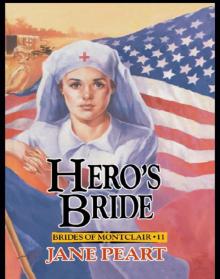 Hero's Bride
Hero's Bride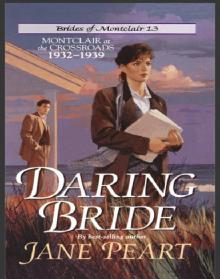 Daring Bride
Daring Bride Runaway Heart
Runaway Heart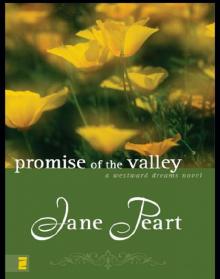 Promise of the Valley
Promise of the Valley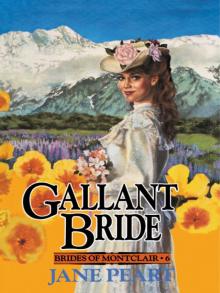 Gallant Bride
Gallant Bride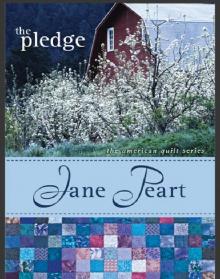 The Pledge, Value
The Pledge, Value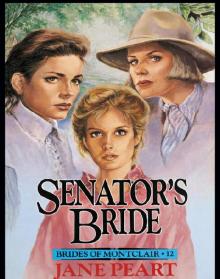 Senator's Bride
Senator's Bride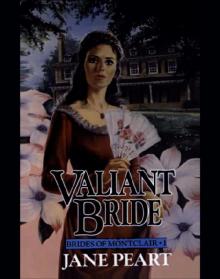 Valiant Bride
Valiant Bride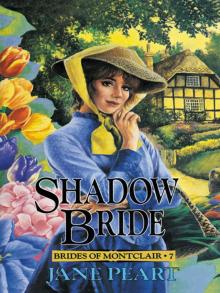 Shadow Bride
Shadow Bride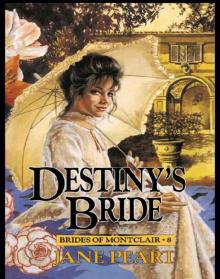 Destiny's Bride
Destiny's Bride A Tangled Web
A Tangled Web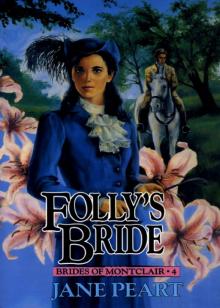 Folly's Bride
Folly's Bride The Promise
The Promise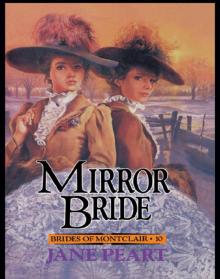 Mirror Bride
Mirror Bride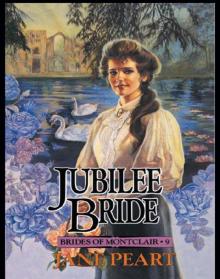 Jubilee Bride
Jubilee Bride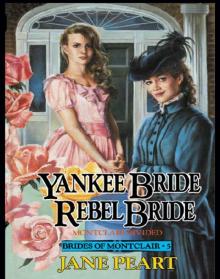 Yankee Bride / Rebel Bride
Yankee Bride / Rebel Bride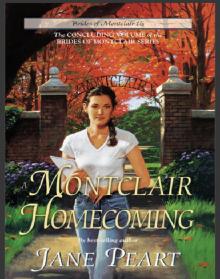 A Montclair Homecoming
A Montclair Homecoming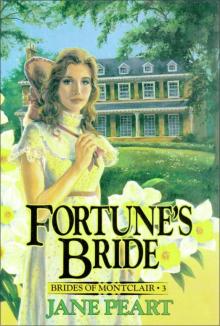 Fortune's Bride
Fortune's Bride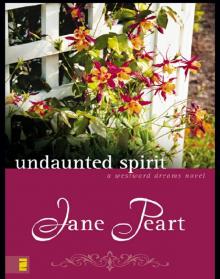 Undaunted Spirit
Undaunted Spirit Love Takes Flight
Love Takes Flight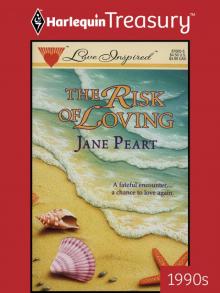 The Risk of Loving
The Risk of Loving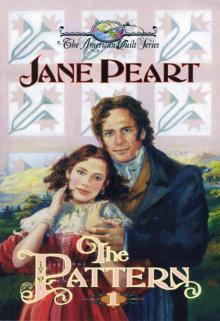 The Pattern
The Pattern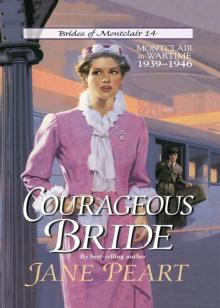 Courageous Bride
Courageous Bride